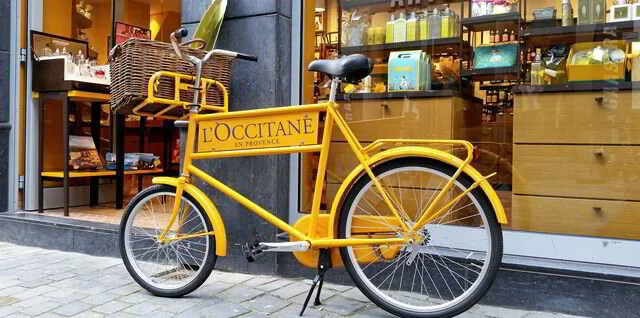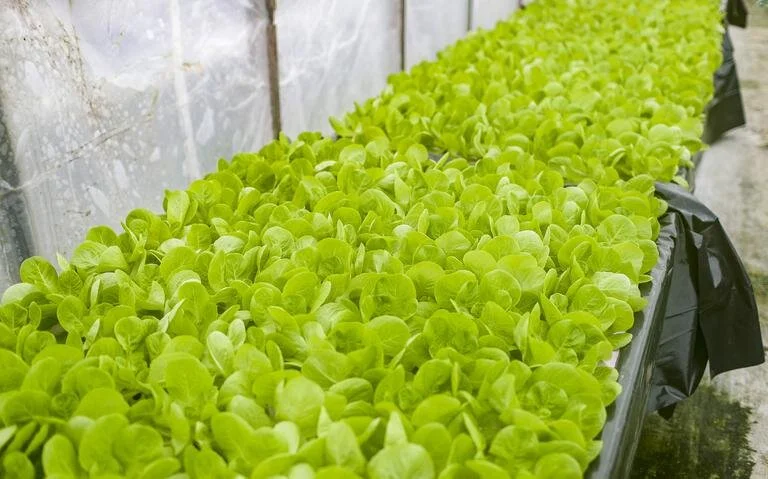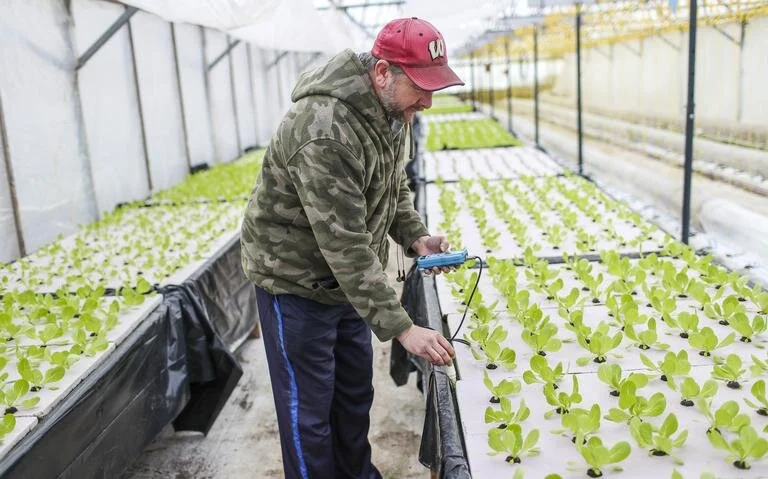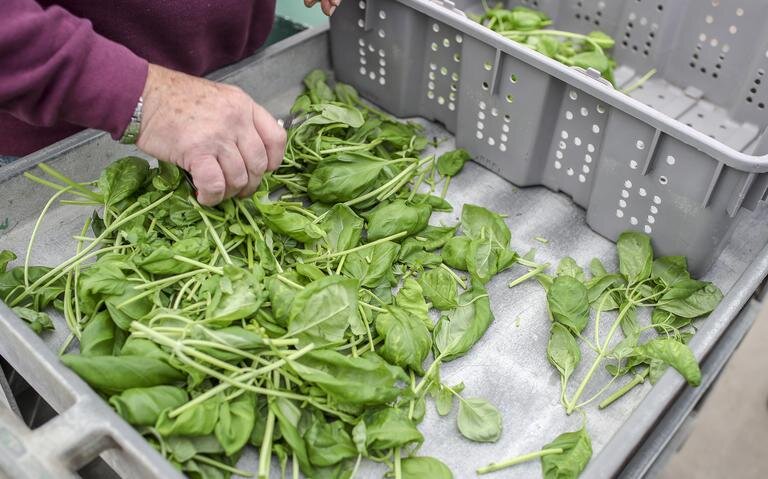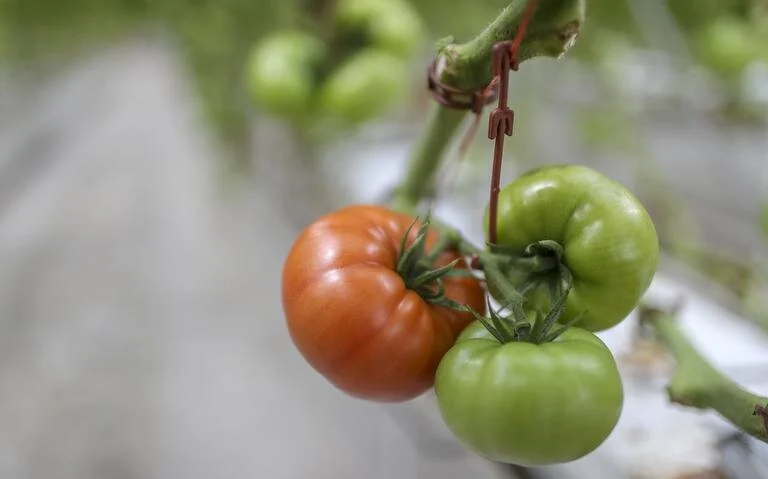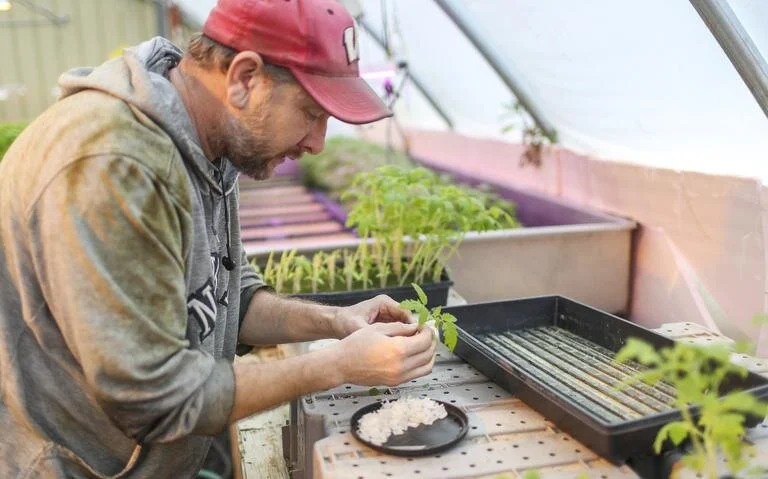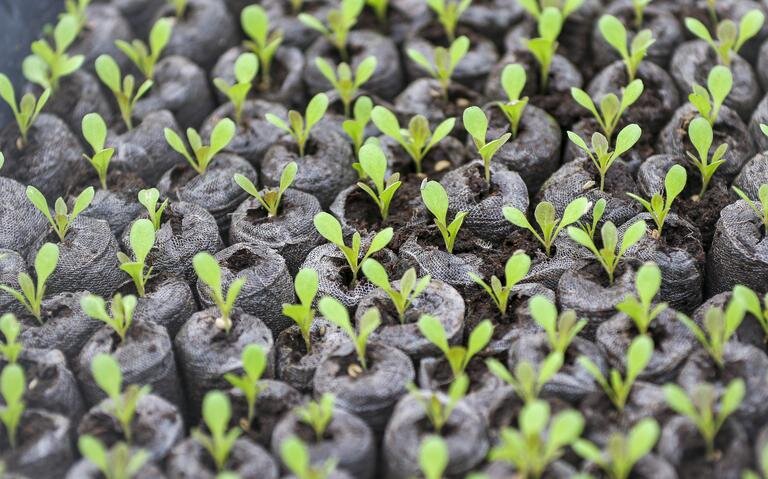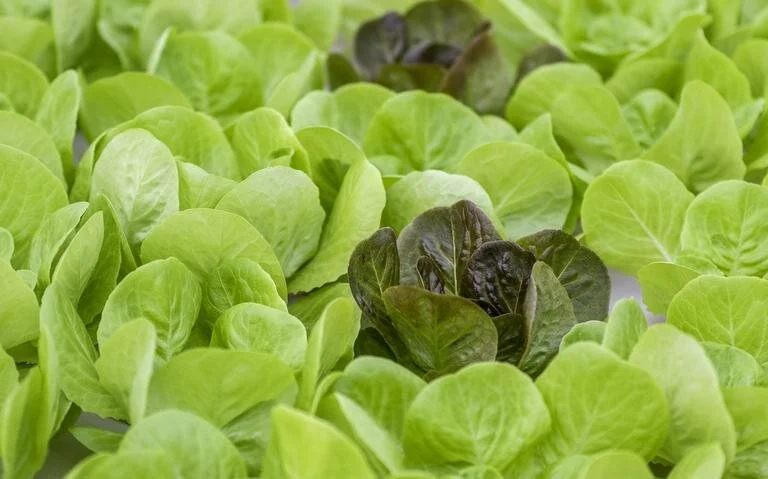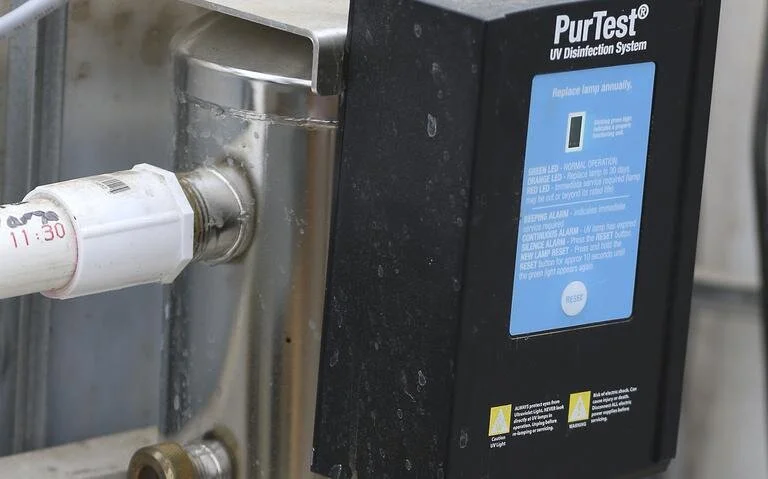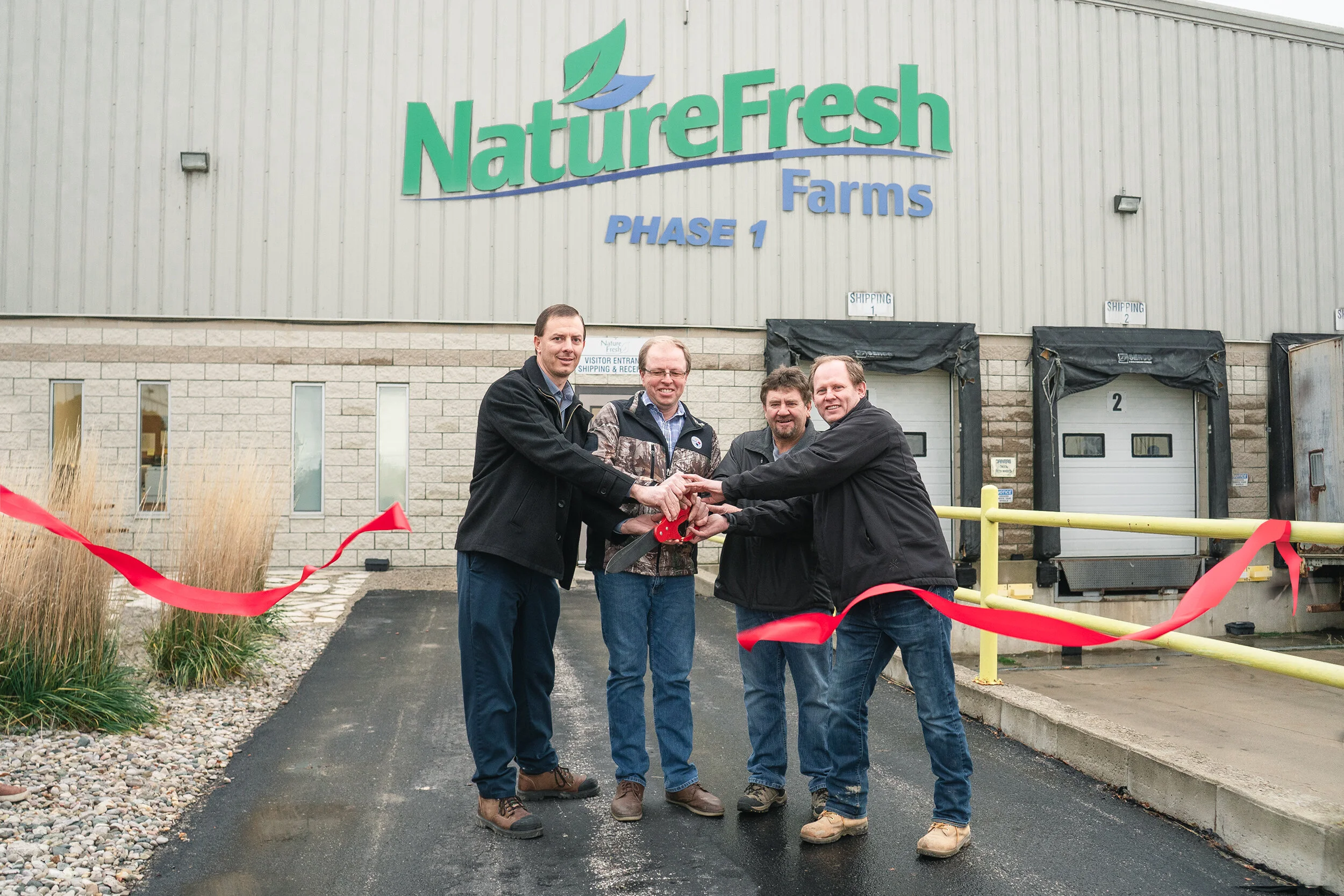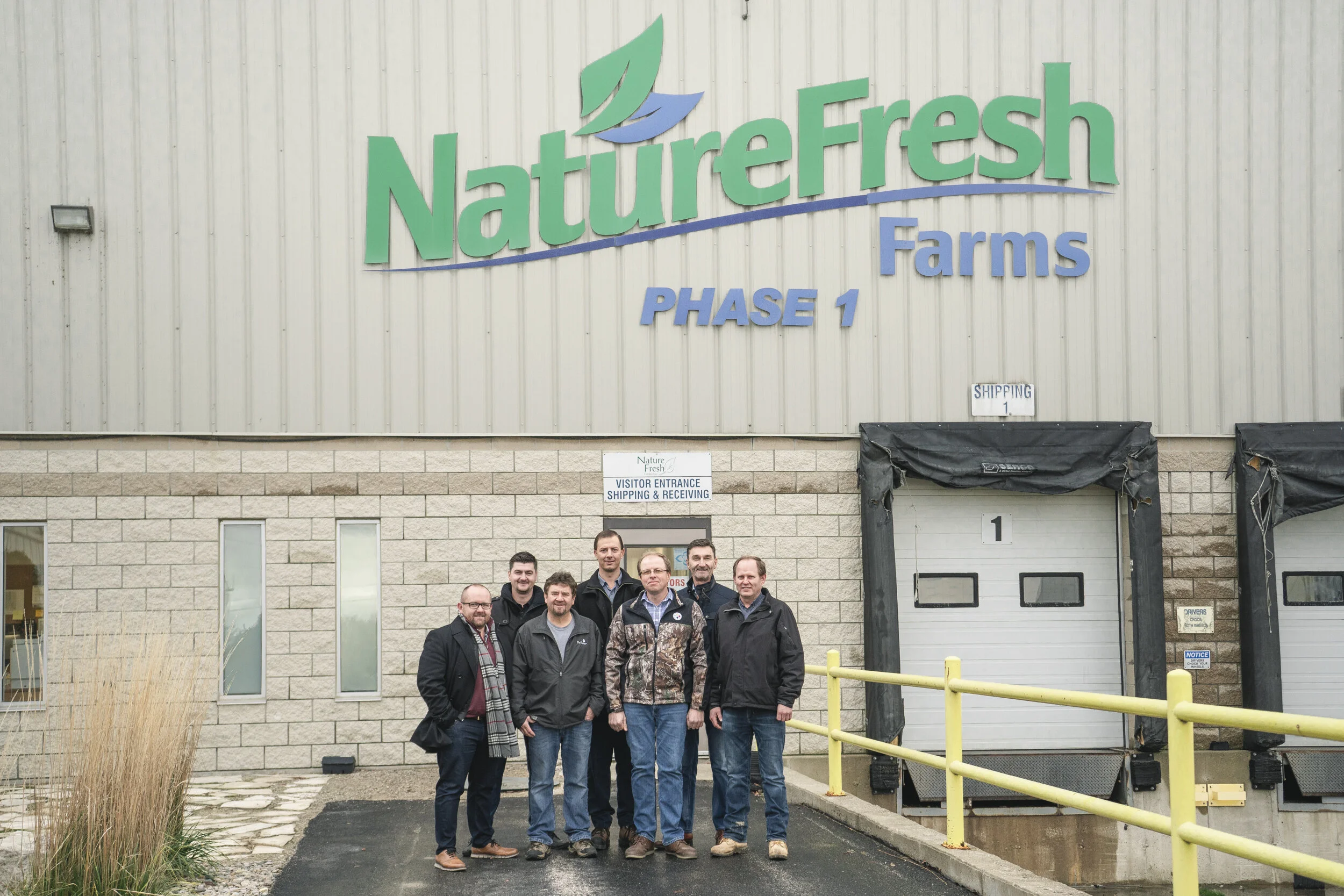
Welcome to iGrow News, Your Source for the World of Indoor Vertical Farming
Hands-Free Cultivation At Fresh Local Produce of Ohio
Green Automation is proud to announce the realization of another project in North America
Green Automation Group's latest project in North America is completed. The fully automated growing system for hydroponic baby leaf lettuce has been installed at Fresh Local Produce of Ohio and is already producing fresh, tasty and sustainable leafy greens for local distribution in Ohio, Pennsylvania, and Indiana.
Our Hands-Free Cultivation in the controlled environment of a greenhouse checks all the boxes for safe and sustainable growing.
WELLINGTON, FLA. (PRWEB) APRIL 06, 2020
Green Automation is proud to announce the realization of another project in North America. The installation of Green Automation’s fully automated growing system at Fresh Local Produce in Hudson, Ohio was completed this winter. Fresh Local Produce of Ohio started their production of fresh baby lettuce in February and can already be found on the shelves of several grocery stores in the area. Fresh Local Produce is selling under the brand “Free! Leafy Greens”.
The name Free! Leafy Greens is referring to everything this baby leaf lettuce is free of; Free of chemical pesticides, herbicides, and fungicides, free of GMO, free of chlorine washes and even free from any hands touching the lettuce. “This is what we call Hands-Free Cultivation,” says Anthony Umina, Managing Member of Fresh Local Produce. “Food safety is at the top of everyone’s priority list today, retailers, restaurants and consumers alike. Our Hands-Free Cultivation in the controlled environment of greenhouse checks all the boxes for safe and sustainable growing” continues Umina.
“With food safety being at the focus of attention in the industry today and an essential component of any successful food production operation, we as a company are taking it upon ourselves to join the Safe Quality Food (SQF) Initiative and raise our food safety standards. By doing so we have implemented a comprehensive food safety system and are preparing for our first voluntary SQF audit to obtain the Food Safety and Quality Certification,” explains Gina Frontino, Food Safety and Quality Assurance Manager at Fresh Local Produce. “In addition to the food safety measures in place, the fully automated growing system brings an extra level of food safety to the operation, as it eliminates any human contact with the lettuce. No-one touches our leafy greens during the entire growing process. We like to call that Worry-Free lettuce,” says Frontino.
The company’s strong focus on responsibly and locally produced lettuce is aligning well with the ongoing trend toward and growing demand for fresh, safe and locally grown lettuce. “Our lettuce is in the stores within 24 hours of harvesting. It does not get much fresher than that, and you can taste the difference,” says Eric Highfield, Chief Agricultural Officer at Fresh Local Produce.
“When choosing the growing system for their operations, Fresh Local Produce asked the right questions,” says Patrik Borenius, CEO Green Automation Americas. “They looked at yield numbers, plant density, labor efficiency and the costs involved to achieve an economically viable operation. Our fully automated growing system with moving open-gutters achieves the highest plant density and operates efficiently on a commercial scale. Fresh Local Produce also chooses a strategic location for their greenhouse. The site is close to the interstate allowing for efficient distribution of their fresh greens and with a population of over 50 Million within 6 hrs. truck drive. In addition, low energy cost was secured at the site and there are opportunities to expand the operations at this location,” explains Borenius.
Free! Leafy Greens are grown and harvested every day, 365 days per year. The new greenhouse operation measures 2 acres and the site is prepared for future expansions. “Right now, we are ramping up the production of phase 1. We will take one step at the time and determine when the time is right to expand,” says Anthony Umina.
About Green Automation Group
Green Automation Group Ltd, headquartered in Finland, and it’s subsidiary Green Automation Americas LLC, based in Florida, develop, manufacture and market the most advanced greenhouse automation systems for lettuce and herb production. The systems are designed for commercial greenhouse operations with a growing area of 1 acre / 0.4 hectares and above. http://www.greenautomation.com
About Fresh Local Produce
Fresh Local produce of Ohio grows and distributes leafy greens under the brand “Free! Leafy Greens”. Free! Leafy Greens are hydroponically grown baby leaf lettuce locally sourced in Summit County Ohio! Our state-of-the-art greenhouse provides a perfect growing environment for our baby leaf, 365 days a year. Our mission is to show our customers what clean and responsibly produced lettuce should taste like. Currently serving OH, PA, and IN communities!
Nature Fresh Farms Sales Welcomes New Team Member To Sales Staff
Zanelle Hough began her career 14 years ago in Logistics working for a South African exporter
Leamington, ON (March 31, 2020)
Nature Fresh Farms Sales expands its team, welcoming Retail Sales Account Manager, Zanelle Hough to their sales department.
Zanelle Hough began her career 14 years ago in Logistics working for a South African exporter. Wanting to gain more experience in sales, she shifted to the Walmart Global Procurement team as a Logistics and Procurement specialist sourcing South African product for the various Walmart and Sam’s Club retail stores in the USA and Asia. Two years later Zanelle fully transitioned to a sales role working for a South African exporter called Freshworld, an organization that specializes in direct retail programs throughout the world. In addition to the retail accounts, she has managed the SunkistTM Global account for various customers throughout Asia and North America.
General Manager, Frank Neufeld shared his enthusiasm for the new extension to their team: “We are very pleased to welcome Zanelle to the Nature Fresh Farms Sales team. Having many years of experience in the produce industry, she will be a great asset in supporting our rapid growth and assisting our customers in the best possible way,” said Frank. “As business continues to expand it’s essential to find key individuals who will help bring Nature Fresh Farms to even greater heights.”
As Retail Sales Account Manager, Zanelle’s responsibilities will include generating sales from new and existing accounts, raising awareness of company offerings while increasing our market share, and building strong relationships with her retail partners. With Zanelle based in Leamington, ON, she will continue to help support the rest of the sales team with her invaluable experience.
“As our company continues to expand and gain market share, we are investing in the growth of our team. Adding Zanelle to the sales team provides us with a strong individual that can continue to help propel us forward,” shared Director of Sales, Matt Quiring. “Culturally, this is a great fit as well. You can see immediately when someone fits into your company’s culture and it excites me for what the future holds!”
With further developments on the horizon, Nature Fresh Farms is thrilled with the growth of the company and the new addition to the team. As business continues to expand, the company is excited to offer new opportunities for professional development.
-30-
About Nature Fresh Farms -
Continuously expanding, Nature Fresh Farms has become one of the largest independent, vertically integrated greenhouse vegetable farms in North America. As a year-round grower with farms in Leamington, ON, Delta, OH, and Mexico, Nature Fresh Farms prides itself on consistently delivering exceptional flavor and quality to key retailers throughout North America, while continuing to innovate and introduce more viable and sustainable growing and packaging solutions.
SOURCE: Nature Fresh Farms | info@naturefresh.ca T: 519 326 1111 | www.naturefresh.ca
UAE: Growing Salads In Dubai
With the world in Lockdown Local warehouse farms can come into their own and show their value, by growing staple salads and not just Microgreens
Uns is the largest operational farm in the UAE and was designed with the intention of providing fresh high-quality produce to the masses of the UAE.
Here at Uns Farms, we took a different approach to the typical ‘concept’ warehouse vertical hydroponic farm, as we believed that these types of projects need to be large in order to make a real impact and actually address food security. To do this, we took the bold step and built a large-scale vertical farm inside a warehouse complex. Uns farm has some 2,000 ebb n flow benches that have 2.88m2 growing area each. This makes Uns one of the largest warehouse growers with over 5,700 m2 of growing space available now.
A global crisis like the COVID19 virus has really highlighted the importance of local produce and the stability it can provide.
Uns Farms being a large operation, has always meant that we grew products for all segments of the market. So, from the start, we had three main product lines or divisions.
Gourmet for the HORCEA industry, Premium for the mass supermarket industry then our specialty lines for all markets. The HORCEA industry has been impacted in a big way, however, there is still a market given the home delivery of food from the Restaurants. Our premium baby leaf market has seen an increase in market share due to the supermarket sales increasing, so people although not eating out still have access to our produce through our distribution in local supermarkets.
Uns is focused on growing the best quality mixture of leaves which we pack as baby leaf’s in a range of six mixes. These are grown for quality, taste & texture. Our micro herbs have always been grown to order so by doing this the slowing down of the market our damage has been limited. Distributors take care of the sales in both the HORECA and retail, while we take care of the growing. Therefore, we are diversified and not too dependent on anyone's market segment.
Customers can reach us for our products through some large chain supermarkets and we are exploring online platforms, but we are constantly battling to expand our reach through as many mediums as possible.
We also have a steady flow of sales directly from the farm and people are welcome to purchase our products directly from the farm as well.
So as one door has closed in hospitality, we have other doors of opportunity and are always looking for the next one. Innovation is not just growing, but sales and distribution are key.
One benefit of indoor warehouse growing is we have more food security, However, we are based in Dubai so now as the summer is arriving we are seeing ‘Normal’ greenhouse farms slowing production down due to the heat and humidity. Here at Uns Farms we are actually increasing production and expanding. Our quality increases due to us being able to control the conditions that we grow in. So we aim to continue to provide our fresh salad and expand our range as indoor growing allows us to be relatively safe from outside elements.
Our products are salad mixes and we have designed them to cater to multinational tastes and cuisines to fit the diverse community of the UAE.
Uns farms were built as a large-scale commercial facility, with the intention of supplying high-grade consumer-based salad products. We were built with the vision to address the masses and to help the UAE fight its dependence on imports and build food security. Given that this farm is the largest in the country,
we only aim to grow larger and cement the UAE as an agricultural powerhouse in the region.
UAE: Armela Farms Gears Up To Open 3 ha Automated Lettuce Farm
After launching in August 2016, the Armela team has spent more than two years in Research and Development regarding techniques, varieties of produce and optimum climate conditions, before celebrating their first harvest in August 2018
After launching in August 2016, the Armela team has spent more than two years in Research and Development regarding techniques, varieties of produce and optimum climate conditions, before celebrating their first harvest in August 2018. Since then, the team has advanced its process to achieve over 250% of an increase in production and is currently finalizing the opening of a new facility for Q1 2021, which will boast over 3 hectares of fully automated advanced lettuce farm, making it the largest facility of its kind in the GCC.
Armela Farms will also partner with several leaders in the Dutch agriculture sector to build the largest automated data-driven growing facility in the United Arab Emirates. Located in Abu Dhabi, the farm will be able to create over 9,000,000 lettuce heads per annum; that’s equivalent to 2,300 tonnes per annum.
Dutch tech
Armela Farms has chosen Van der Hoeven Horticultural Products to supply the project. In conjunction, Armela Farms will be using specialist technologies from a variety of suppliers like Hoogendoorn, Patron Agri Systems, Green Production Systems, Rijk Zwaan, Jiffy, Koppert, due to the expertise and experience by each company in their individual fields.
Mr. Avir Shah, CEO, and Founder of Armela Farms states, “Our aim is to produce products which exceed our community's expectation and reduce the reliance of imported highly-priced products by bridging the supply and demand gap with affordable price. We can achieve this vision by utilizing available resources and transforming it into a hi-tech, sustainable food production facility in accordance with the country’s vision of National Food Security and self-sustainability.”
Mr. Yazan Abu Jaish, General Manager of Armela Farms: “The new facility, for example, will enable us to monitor the evaporation of a single plant at any given time and many other advanced parameters required for optimum plant grown and output. Armela Farms is now moving from traditional hydroponic farming to data-driven farming.”
Mr. Gerard Oorthuys of Van der Hoeven Horticultural Projects: “I was very impressed by the sheer knowledge of the Armela farms team and wanted to show them one of our constructed greenhouses to show our capability. From our regional experience, we understand the climatic challenges more than any other company and we are confident we will deliver them a fantastic project.”
For more information:
Armela Farms
armelafarms.com
Publication date: Mon 9 Mar 2020
Singapore Hotel Turns Over A New Leaf With Aquaponics Farm
The aquaponics farm at Singapore's Fairmont is expected to provide 30 percent of the hotel's vegetable needs by August
What Goes Around Comes Around in The Fairmont's Rooftop Garden
Producing Vegetables and Fish for Guest Meals
AFR Travel Editor
Feb 19, 2020
In New York and London, rooftop gardens have become the must-have accessory for any self-respecting luxury hotel. In what is being touted as a first for a Singapore hotel, the Fairmont has joined the crowd with an urban aquaponic farm.
Aquaponics involves growing plants without soil, using a “closed, circular system” that channels the waste from living fish to fertilize the plants, which in turn filter and clean the water for the fish.
By August, the hotel expects its farm to provide 30 percent of its monthly vegetable needs.
The plants are grown on flatbeds and in densely packed towers. The 450-square-meter farm, launched late last year, was created on a covered outdoor terrace on level five, wedged between the 26-story Fairmont and its adjoining Swissôtel sister property. Both are part of French chain Accor, as is historic Raffles across Bras Basah Road.“
We need to manage sustainability and climate change,” says Michael Issenberg, chairman and CEO of AccorHotels Asia Pacific. “Accor is working to eliminate plastic, food wastage, and to generally improve our ecological footprint. The aquaponic farm is a superb initiative.”Stumbling into this farm, you find yourself surrounded by edible greenery including english spinach, water spinach (kangkong), mint and numerous varieties of lettuce. The plants are grown in rows of flatbeds and densely packed towers.
In large containers at the back of the farm, 1600 tilapia fish play their part in this cycle. The bad news for said fish is that by next month, the Fairmont will be serving them as meals.
The greenery is already gracing the dining tables of the three hotels, featuring in a signature aquaponics salad.
At a glance
Fairmont Singapore Solid five-star luxury with more than 700 rooms and suites located in two towers (north and south). Book in the north tower – the rooms have undergone a lavish renovation, and the higher floors overlook Marina Bay. (Our top tip: don’t miss dining at Jaan by Kirk Westaway on the 70th floor of the adjoining Swissôtel.)
Raffles Singapore Following its extensive refurbishment, the 115-room Raffles re-opened in late 2019 and is more wow than ever. As the saying goes: “When visiting Raffles, don’t forget to see Singapore.”
The newly renovated Raffles Singapore is open for business.
British Airways Flies direct from Sydney to Singapore. Unfortunately, it’s still the old Club World business-class product on the route. But old or new seats, the champagne tastes the same.
The writer traveled to Singapore with British Airways and stayed as a guest of AccorHotels.
Lead photo: The plants are grown on flat beds and in densely packed towers.
Harvest Fresh Canteen Vegetables On-Site
In schools and universities in America, the catering and service provider Sodexo plans to produce fresh vegetables all year round via indoor farming. To this end, the company is cooperating with the US hydroponics provider Freight Farms. The salad should grow vertically in containers on campus
by Frauke Brodkorb-Kettenbach
February 15, 2020
In the container greenery of the US company Freight Farms, Sodexo grows fresh vegetables for its cafeterias directly on campus. CAROLINE KATSIROUBAS / FREIGHT FARMS
In schools and universities in America, the catering and service provider Sodexo plans to produce fresh vegetables all year round via indoor farming. To this end, the company is cooperating with the US hydroponics provider Freight Farms. The salad should grow vertically in containers on campus.
Over 500 vegetables, such as Salanova Green Butter Salad (pictured), can be grown on a commercial scale in Freight Farm’s containers with 320 square meters of vertical acreage - regardless of the season and without pesticides or herbicides. Delivery routes are also eliminated with this type of vegetable cultivation.
Save resources
With the cooperation, Sodexo is pursuing its strategy of operating as sustainably as possible and at the same time being precisely informed about the origin of its food for customers in the education segment.
In addition, students could monitor the stages of growing their food. For example, schools could integrate hydroponic farming into interactive curricula or school subjects such as technology, agriculture, nutrition, and economics, according to Freight Farms' approach. The vertical farming provider also sees similar advantages for employees when using the containers in companies.
CAROLINE KATSIROUBAS / FREIGHT FARMS
So far, vegetables grow in freight farm containers in 25 countries and 44 states in the US - in small and medium-sized businesses, hospitals, as well as in retail and non-profit organizations, the information says. 35 school facilities now work with the hydroponics system. By working with Sodexo, the number should grow rapidly.
SODEXO, USA
Sodexo USA offers building management and catering services to schools, universities, hospitals, senior citizens' communities, venues, and other key industries. The parent company Sodexo Quality of Life Services, with headquarters in Issy-les-Moulineaux, France, was founded in 1966. According to its own statements, the group offers Benefits and Rewards Services and Personal and Home Services daily for 100 million people in 72 countries. In 2019, it had an annual turnover of 22 billion euros with 460,000 employees worldwide. The portfolio includes reception, security, maintenance and cleaning services, catering, facility management, restaurant, and gift vouchers and fuel passes for employees.
Locally Grown Salad Supplier Expands Distribution In The Mid-Atlantic
The expansion will include over 330 Food Lion stores throughout the state of Virginia that will be serviced from BrightFarms’ Culpeper, Virginia greenhouse
Including All 330 Virginia Food Lion stores
BrightFarms, a supplier of locally grown salads for supermarkets, is expanding distribution in the Mid-Atlantic with retail partner, Ahold-Delhaize USA. The expansion will include over 330 Food Lion stores throughout the state of Virginia that will be serviced from BrightFarms’ Culpeper, Virginia greenhouse.
Since 2016, BrightFarms locally grown salads have been sold throughout the Mid-Atlantic in more than 160 Giant Landover stores. The new Food Lion stores will expand BrightFarms’ reach into Virginia Beach, Williamsburg, and communities in western Virginia. It will also strengthen BrightFarms’ presence in Charlottesville, Richmond, and Norfolk, growing the company’s customer base and making its local, pesticide-free produce accessible to more consumers. The Food Lion portfolio will include popular BrightFarms’ varieties like Sunny Crunch, Baby Spinach, Spring Mix, Baby Arugula and Mixed Greens.
BrightFarms’ Culpeper greenhouse has also supplied GIANT Food Stores in Pennsylvania since 2017. Increasing consumer demand from those stores led BrightFarms to open its newest greenhouse in Selinsgrove, Pennsylvania earlier this year. GIANT began sourcing product from the 280,000 sq. ft. Selinsgrove greenhouse earlier this month, enabling the Culpeper greenhouse to begin supplying all Food Lion stores in Virginia.
“Ahold-Delhaize USA is a leader in local produce. Since launching with Giant Landover in 2016, we’ve been fortunate to partner with several of their brands,” said Steve Platt, CEO of BrightFarms. “With our increased capacity on the East Coast, we're thrilled that we now have the opportunity to supply Food Lion’s Virginia stores with our fresh, delicious and pesticide-free greens.”
“Food Lion is committed to providing locally sourced, fresh, healthy and affordable produce for our customers across the towns and cities we serve. We’re excited about this expanded partnership with BrightFarms, which will expand our ability to deliver to our Virginia customers the high-quality, locally grown salad greens they expect from Food Lion,” said Chris Dove, Food Lion’s vice president of Produce Category and Merchandising.
For more information:
Amanda Mantiply
BrightFarms
Tel: 443.961.2418
Email: amanda@abelcommunications.com
www.brightfarms.com
Publication date: Fri 28 Feb 2020
Nature Fresh Farms Matt Quiring Transitions Role to Director of Sales
As Director of Sales, Matt will now be overseeing the development of all their retail accounts. “Matt’s transition into Director of Sales was a very easy and natural choice,” shared Vice President, John Ketler
Leamington, ON (February 21, 2020) – Nature Fresh Farms announced Matt Quiring’s recent role transition from Executive Retail Sales Accounts, Manager, to Director of Sales.
Matt Quiring, son of Nature Fresh Farms president and founder Peter Quiring, showed interest in Nature Fresh Farms at an early age, after gaining experience outside of the industry he joined Nature Fresh Farms Sales established in 2010. Developing his retail accounts from the ground-up, he advanced into the role of Executive Retail Sales Accounts Manager. In this position, Matt played an important role in developing partnerships with many of their major retailers and various customers.
As Director of Sales, Matt will now be overseeing the development of all their retail accounts. “Matt’s transition into Director of Sales was a very easy and natural choice,” shared Vice President, John Ketler. “With Matt handling the vast majority of our sales to date, it is clear that he has the drive, passion, and industry knowledge necessary to develop these relationships with our partners.”
General Manager, Frank Neufeld also expanded on Matt’s transition mentioning Nature Fresh Farms continuous expansion and what it means for the company. “With the growth of Nature Fresh Farms and Nature Fresh Farms Sales, we are welcoming many new members to our team, including additional sales staff. It was evident to us, seeing Matt’s experience, that he would be the one to lead the entire sales team moving forward,” said Frank. “We look forward to Matt bringing his leadership and mentoring skills to the rest of the sales team, helping them to strengthen the relationships he has established over the last several years with our partners.”
As Nature Fresh Farms focuses on company growth and developing relations, Matt’s role will assist in the continued progression of their team and retail partnerships. Nature Fresh Farms is excited for their future with the continuous expansion of their team, their advancements in technology and product innovation allowing them to provide fresh produce all year-round.
-30-
About Nature Fresh Farms -
Continuously expanding, Nature Fresh Farms has become one of the largest independent, vertically integrated greenhouse vegetable farms in North America. As a year-round grower with farms in Leamington, ON, Delta, OH, and Mexico, Nature Fresh Farms prides itself on consistently delivering exceptional flavor and quality to key retailers throughout North America, while continuing to innovate and introduce more viable and sustainable growing and packaging solutions.
SOURCE: Nature Fresh Farms | info@naturefresh.ca T: 519 326 1111 | www.naturefresh.ca
Hamilton’s 80 Acres Farms To Grow Tons of Tomatoes On New York City’s Fifth Avenue
Hamilton-based 80 Acres Farms will grow tomatoes on one of the busiest streets in New York outside the Solomon R. Guggenheim Museum. The grow is part of “Countryside, The Future,” the Guggenheim’s new exhibition in collaboration with Rem Koolhaas, which opens to the public Feb. 20, and runs through Aug. 14
February 21, 2020
By Eric Schwartzberg, Staff Writer
HAMILTON —
80 Acres Farms will grow tomatoes on one of the busiest streets in New York outside the Solomon R. Guggenheim Museum.
The grow is part of “Countryside, The Future,” the Guggenheim’s new exhibition in collaboration with Rem Koolhaas, which opens to the public today and runs through Aug. 14.
Along with its commercial partner’s Infinite Acres and Priva Holding BV, 80 Acres Farms will grow cherry tomatoes in an indoor grow area right outside the museum on Fifth Avenue.
80 Acres Farms is a leader in indoor growing for retailers such as Kroger, Jungle Jim’s International Market, Whole Foods, Dorothy Lane Markets, and Giant Eagle.
MORE: ‘The perfect home’: Why 80 Acres chose Hamilton to move its headquarters and create 125 jobs
People in New York will be able to look through a large window in the indoor farm to view a crop of fresh tomatoes being grown continuously during the next six months. The first tomatoes grown will be ready for harvesting and consumption by late March.
The “Countryside, The Future” exhibition will examine political forces, social issues, and environmental factors altering landscapes across the world, including traditional farmlands.
“We believe that what we are doing is about the future of food,” said Mike Zelkind, chief executive officer of 80 Acres Farms. “We are changing the way fruits and vegetables are grown and harvested locally then delivered to grocers the very next day. There is an enormous market and consumer appetite around the world for produce that our crop scientists and other food experts have been perfecting during the past five years.”
MORE: Dilapidated Hamilton building transforms into an industry-changing grow facility
Zelkind said 80 Acres’ participation in the “Countryside, The Future” exhibition will allow New York residents and visitors to experience how “the freshest, tastiest locally-grown tomatoes” can be grown year-round indoors in one of the busiest cities in the world.
For the Guggenheim exhibition, 80 Acres Farms, Infinite Acres, and its Priva partners have collaborated on the 700-square-foot grow center, which is expected to grow 50,000 tomatoes in six months. Additional tomatoes will be donated to City Harvest, a New York City food rescue organization that recovers excess food and distributes it to people in need.
MORE: Hamilton’s large indoor growing operation is so advanced they want it around the world
Last year saw a massive year of growth for 80 Acres. It opened its automated facility on Enterprise Drive, a facility that grows leafy vegetables, herbs and strawberries, then a downtown Hamilton location on South 2nd St. that grows vine crops, including tomatoes, cucumbers, and peppers.
The company also launched Infinite Acres, an independent joint venture aimed at providing large-scale indoor farming facilities worldwide. The venture also includes UK-based Ocado Group, one of the world’s largest dedicated online grocery retailers, and Netherlands-based Priva Holding BV, a leading provider of technology solutions, services, and automation systems to horticultural and other industries.
That partnership is now building large-scale, fully automated indoor farms in the United States, Asia and Europe.
It also inked a deal to moved its headquarters from Cincinnati to Hamilton and was granted a tax credit for committing to create 125 new jobs and investing at least $26.9 million.
MORE: Innovative Hamilton indoor growing company part of a worldwide deal to supply food
L'Occitane-Backed Group To Open Europe's Largest Aquaponic Farm in 2022
AMP Saumon de France is backed by the financial muscle of international body, face, and fragrance products company L'Occitane, which has some 1,500 stores in 90 countries
The AMP Saumon de France Project is Backed by The Financial Muscle of Fragrance Products Company L'Occitane.
16 January 2020
By John Evans
France's Aquaponic Management Project Group (AMP) said it expects to open Europe's largest Aquaponic farm in 2022.
Around €12 million ($13.4 million) is being plowed into the project, which is at the study stage with work beginning.
AMP unveiled the venture in conjunction with agricultural cooperative Scael last year.
The site is expected to annually produce 1,000 metric tons of trout.
The Olis Les Jardins du Saumonier Chartres, southwest of Paris, is backed by funding from investment bank Alantra.
The project is led by Aquaculture Operations Director and Designer Olivier Soulas who joined last August from Building Integrated GreenHouses (BIGH), which bills itself a developer of sustainable aquaponics urban farms operating under the principles of the circular economy.
AMP, led by businessman Pascal Goumain, operates France's largest sea-based farm with an annual 3,000 metric tons salmon and trout producing capacity off the coast of Cherbourg in the north of the country.
It operates six salmon farms in Normandy capable of producing 1,200 metric tons annually.
The company also operates two aquaponic urban farms under the brand name Les Jardins du Saumonier in Cherbourg and Asnieres sur Seine.
AMP Saumon de France is backed by the financial muscle of the international body, face, and fragrance products company L'Occitane, which has some 1,500 stores in 90 countries.
Lead photo: L'Occitane, French body, face, and perfume products giant. Photo: Flickr / @MichelCuri
Eastgate’s Aquaponic Farm District A First For Shopping Centers In Africa
Eastgate’s Aquaponic Farm District utilizes smart new technologies to provide sustainable solutions to food production and food security for customers, offering 100 percent natural and fresh produce at the source
Eastgate’s Aquaponic Farm District utilizes smart new technologies to provide sustainable solutions to food production and food security for customers, offering 100 percent natural and fresh produce at the source.
January 23, 2020
Justin Hess with organic basil produced in the aquaponic farm district at Eastgate.
Eastgate Shopping Centre has become trailblazers by being the first center to have a rooftop Aquaponic Farm District in Africa.
The farm is in partnership with influential aquaponic company Ichthys.
Produce from the farm has been on sale since December 2019.
Ichthys managing director and Eastgate farm manager, Justin Hess, said aquaponic farming is one of the recent innovations in agriculture.
Eastgate’s Aquaponic Farm District is situated on the rooftop at entrance 10 of the center.
“The basic idea is combining hydroponic farming, where you grow plants without soil, which is a nutrients solution, with a fish farm known as an aquaculture farm. Aquaponics comes from combining aquaculture and hydroponics,” said Hess.
He said it’s one of the only organic ways to hydroponically grow vegetables.
The aquaponic farm district at Eastgate has three 10 000 liter fish tanks with 200 Pangasius fish.
Hess said this method has been around for the past 25 years, although in Africa it is still very new, with only a handful of farms adopting this method.
“The biggest advantage of aquaponic farming is it 100 percent recycles all water used. The water from the fish tanks is circulated between all our plants and is returned again,” said Hess.
Justin Hess with produce grown via the hydroponic deep water method.
Hess said the fish becomes the fertilizer as they eat and excrete in the water and that nutrients run through the system.
He said the nutrients become toxic for the fish if you do not clean it, but the plants clean the nutrients in that water, which never has to be replaced.
Justin Hess with organic basil produced in the aquaponic farm district at Eastgate.
“We have three 10 000 liter fish tanks with 200 Pangasius fish which are from Thailand originally. If you are eating the fish in a restaurant it is called Basa,” said Hess.
He said it’s one of the nicest fish to eat and this is one of the first aquaponic Pangasius farms in South Africa.
“There is a main commercial farm in Midrand, which is the largest aquaponics farm in Africa. There is about six other commercial farms in South Africa which is adopting this method and a handful in Africa,” said Hess.
Alana Hoskins enjoying an organic grown tomatoe from Eastgate’s Aquaponic Farm District.
He said the district includes a fish farm and a hydroponic section.
Hess said there are three methods of growing in the hydroponic section of the farm namely stone and drain, deep water and vertical.
The farm grows tomatoes, cucumber, letters, chili peppers, basil, chives, spring onion, mint, and spinach, among others.
Tomatoes grown at he aquaponic farm district at Eastgate shopping center.
Alana Hoskin, marketing manager for Eastgate Shopping Centre, said the center was introduced to the concept a year ago.
“One of the focuses for the center in 2020 is sustainability and how we can make a difference within our own community and for our customers. We felt like this was the right direction. We are the first shopping center to have a rooftop aquaponic farm,” said Hoskins.
She said the center turned 40 last year, and now wanted to think differently and do something that will set the center away from any other.
Organically grown basil at Eastgate’s Aquaponic Farm District.
“We want shoppers to consciously choose Eastgate for a reason, and the aquaponic farming is a good reason,” said Hoskins.
Hoskins said aquaponic farming is a sustainable solution for the east rand as there is a need to have an organic offering.
The hydroponic section at the aquaponic farm district at Eastgate Shopping Centre.
In the future, Hoskins said the center is looking at offering a few courses for the community on how to start their own aquaponic farms.
Fresh produce from the farm is sold from 9 am to 12 pm every Saturday at Entrance 10 at the rooftop entrance where the farm is located.
Alana Hoskins and Justin Hess.
“We will extend the time once we harvest more. We have also incorporated our recycling bins such as glass, general waste, and paper at the farm district, as it gives into the sustainable lifestyle as a whole. Thinking organic is thinking about recycling as well. We made it easier for customers to come and do their recycling and then purchase organic produce.
“In 2020 our motto is ‘be the change’. We have done a number of eco-friendly projects at the center and will continue to do so to create a better environment,” said Hoskins.
For more information contact center management or visit www.eastgatemall.co.za.
PixzAR
Vertical Farming vs. Greenhouse Farming
When starting a farming operation, the first choice you face is what type of farm to start
June 1, 2019
When starting a farming operation, the first choice you face is what type of farm to start. The options are many: indoor vs. outdoor; arable vs pastoral; intensive vs. extensive. For farmers going the indoor route, one of the biggest decisions is between vertical farms and greenhouses. Both vertical farms and greenhouses operate indoors, which means they enjoy benefits like climate control, year-round growing, and chemical-free pest control.
However, there are as many differences between these types of farms as there are similarities. Each one serves a unique purpose; but, they can be compared in terms of efficiency. For a long time, it was thought that greenhouses were more efficient and profitable than vertical farms, due to the lack of a need for artificial lighting. But recently, a study out of Quebec showed that vertical farms enjoy a number of benefits over greenhouses–especially if the farm is operating for commercial purposes.
To understand what those benefits are, we first need to understand the reasons for farming indoors in the first place.
WHY GROW INDOORS?
For most of human history, farming has been an outdoor operation. Plants need sunlight to live, and soil to get water and nutrients from, so it’s no surprise that the traditional farm is an outdoor farm.
But as agriculture developed, farmers gradually realized that there were benefits to farming indoors. For one, it allowed certain crops to be grown all year long. For another, it kept pesticides at bay. And finally, indoor farming in ‘hot’ greenhouses could cause plants to grow faster than they would outdoors. By the late Roman Empire, greenhouse-like methods were already being used for these and other reasons.
In the 1800s, Greenhouses hit their stride, as European farmers started using them to grow tropical plants that otherwise wouldn’t grow naturally on their continent. This fact illustrates the main benefit of indoor farming: it provides the ability to grow crops year round, in a controlled environment, free from pests.
if you want it a bit shorter, this whole section can easily be cut
THE DIFFERENCES BETWEEN VERTICAL FARMS AND GREENHOUSES
Although vertical farms and greenhouses are both indoor facilities, the similarities end there. First, greenhouses rely on sunlight, while vertical farms rely on artificial light. Second, vertical farms have plants stacked in layers, while greenhouses have them arranged on one horizontal plane. Third, vertical farms can operate in urban areas, while greenhouses require a large amount of space and are therefore best suited for rural or suburban environments.
Many people have argued that, because vertical farms require artificial light, they are necessarily less efficient than greenhouses. It is true that artificial light is a major cost at vertical farms. However, the paper “Comparing a Greenhouse to a Vertical Farm in Quebec” showed that growing lettuce in a vertical farm can actually be more profitable than growing it in a greenhouse, owing to two factors: increased yield per square meter, and centralized distribution.
"When starting a farming operation, the first choice you face is what type of farm to start. The options are many: indoor vs. outdoor; arable vs pastoral; intensive vs. extensive"
YIELD
The main advantage that vertical farms have over greenhouses is greater yield per square meter. Although vertical farms have higher light and heat costs, they have the benefit of more produce grown per unit of soil. This means that even though vertical farms cost more to operate, they produce more crops, with the end result being higher revenue.
The policy paper mentioned proves this through the results of a simulation, which showed that lettuce grown in a vertical farm has a slightly higher yield than that grown in a greenhouse.
DISTRIBUTION
One major advantage of vertical farms is centralized distribution. Because these farms can be run in warehouses or almost any kind of building, they can be located in urban areas. This puts them right at the heart of major distribution hubs, in the middle of a big local customer base. So, compared to a rural greenhouse, a vertical farm has less distance to travel to get to customers, and when it does have to ship over a distance, it has better transportation options.
As a result, vertical farm crops can be sold more quickly and at higher margins than greenhouse crops. According to the Quebec paper, this creates a perception of freshness that helps the vertical farm produce sell quicker than the greenhouse equivalent.
GROSS PROFITS
As a result of centralized distribution, vertical farms may enjoy higher gross profits than greenhouses. The Quebec paper showed this to be the case specifically for lettuce grown in the Quebec area. Although the wholesale price of lettuce produced at greenhouses and vertical farms is usually the same, the vertical farm’s lettuce may enjoy a premium when sold in its local market due to the perception of freshness. Additionally, because the vertical farm is located in an urban area, it can ship more fresh produce to more customers, without high transportation costs.
A second reason for the higher gross profits at vertical farms is winter heating costs. It’s almost taken as a gospel truth that greenhouses use more electricity than urban farms. But that’s not necessarily the case. It really depends on the specific farm(s) in question. As the Quebec experiment showed, in areas that get extremely cold in the winter, Greenhouses can be very expensive to heat. Depending on how rural their location is, they may need to be heated by a generator; and depending on their size, they may consume quite a bit of electricity. So while the vertical farm needs to be heated year round, the greenhouse can actually be more expensive to heat in the crucial winter season.
GROWTH POTENTIAL
One area where vertical farms really shine is the potential for growth. While sales from greenhouses are growing at 8% year-over-year, sales from vertical farms are growing at a full 30% annually. That means that vertical farms are growing more than three times as quickly as greenhouses. While part of this can be explained by the fact that vertical farms are newer than greenhouses, it also has to do with centralized distribution. Since vertical farms have access to urban distribution centers, they can get more product out, more quickly, than greenhouses can. The greater yield per square metre of vertical farm space also contributes to this fast growth.
PUTTING IT ALL TOGETHER
Vertical farming is the cutting edge of agriculture. Offering the ability to grow more crops, in a controlled environment, inside major distributions hubs (i.e. cities), it takes advantage of economies of scale in a way no other farming operation can. In the past, many critics have cited lighting costs as a stumbling block to profitability for vertical farms. But as the Quebec research paper showed, vertical farming can actually be more profitable than a conventional greenhouse operation. Especially when situated in major urban centers, and taking full advantage of the distribution benefits that come with that, vertical farms can be highly profitable. And when you add the benefits of automated labor into the equation, the benefits can be greater still.
We see VF as the evolution of the greenhouseWe see VF as the evolution of the greenhouse
Latest developments in LED (less consumption) and solar energy (higher efficiency) will reduce the biggest remaining cost factor (energy) during the next years
Automation will increase the benefits of a VF even further
MORE NEWS
Europe’s most automated Vertical Farm in Basel (CH)
August 1, 2019
Growcer is setting up Switzerland’s first vertical farm in Basel. At the same time, it’s one of Europe’s most automated Vertical Farms using latest achievements in Robotics & AI. The farm is six floors high and can produce leafy vegetables, herbs, shoots and fruit all year round.
How do we feed a growing population most of whom live in cities?
Why We Don’t Use Containers For Our Farms
July 1, 2019
When you decide to start a vertical farm, you’re immediately faced with a number of choices.
Should you put your farm in an urban location, or a rural location?
In a cold environment, or a warm one?
Should you use hydroponic systems, or soil?
About Growcer
May 1, 2019
Feeding the world has always been a challenge. With ever-growing populations and a limited supply of food, innovations are needed to make food better, cheaper, and more abundant. From the early days of agriculture to the mass farming of today, new technologies have arisen to meet the challenge of providing food for the world….
Lettuce Scare Spurs Sales At Superior's Bay Produce
Recent outbreaks of foodborne illnesses have generally been bad news for lettuce growers nationwide, but one greenhouse operation in snowy Superior reports its sales actually have been bolstered as consumers search for healthy alternatives to field-grown greens
Written By: Peter Passi | Dec 21st, 2019
Greenhouse with a mission delivers safe greens to the local market.
Rich Fisher, Bay Produce's head grower, checks the pH level of the water in flats growing butterhead lettuce at Bay Produce in Superior. (Clint Austin / caustin@duluthnews.com)
Recent outbreaks of foodborne illnesses have generally been bad news for lettuce growers nationwide, but one greenhouse operation in snowy Superior reports its sales actually have been bolstered as consumers search for healthy alternatives to field-grown greens.
Bay Produce, located next door to the Mariner Retail and Business Center, has found a strong market for the red and green butterhead lettuces it grows in the wake of a national lettuce scare.
"It seems like any time there's a lettuce recall, our sales go up," said Don Gitz, a specialist for Bay Produce.
Most recently, the U.S. Food and Drug Administration warned consumers to avoid eating romaine lettuce harvested in California's Salinas Valley — a prolific agricultural region often referred to as the nation's salad bowl. This latest E. coli outbreak resulted in more than 100 reported cases of illness in 23 states. But regulators advised people that there was no reason to avoid hydroponic and greenhouse-grown lettuce.
8 / 8
The silver tube at the center of the photo houses a high-intensity ultraviolet light used to kill pathogens in the water at Bay Produce in Superior. (Clint Austin / caustin@duluthnews.com)
Bay Produce fits that bill to a T. It grows lettuce, basil, tomatoes, cucumbers, peppers and eggplant inside a 1 1/2-acre greenhouse equipped with hydroponics.
Rich Fisher, Bay Produce's head grower, said the greenhouse uses Superior city water that has been treated with ultraviolet light, rendering it "99.9% microbe-free."
He contrasted the sterile greenhouse setting at Bay Produce to farm fields where lettuce is often grown on plots adjacent to livestock "where they really have almost no control over runoff."
In addition to producing a consistently safe and tasty product, Bay Produce also has a story to sell. The greenhouse is operated by Challenge Center Inc., an organization established by Catholic Charities 50 years ago to serve children and adults with developmental disabilities. The greenhouse is staffed with 10 Challenge Center staff members and up to about 40 clients at any given time.
Challenge Center Director Mark Kroll said the greenhouse provides a sheltered work setting that can accommodate clients' unique needs, whether that's a short two-hour shift or one accompanied by a job coach.
"We provide sheltered employment for folks with disabilities," Kroll said. "It's an amazing program we have here. So, we already have a lot of local folks looking for our projects anyway, because they support our mission. But this provides a little extra push for us. It's one more reason for folks to look for Bay Produce products."
Bay Produce has enjoyed a safety edge over larger growers in regard to other products, too. For instance, earlier this summer people across the nation were sickened with cyclosporiasis from contaminated basil grown in Mexico. Again, Bay Produce offered a safe alternative.
"It's amazing how things that happen on a national scale that make the national news can really affect local growers," Kroll said.
Bay Produce distributes its products exclusively in the Northland through grocers and restaurants as far north as Grand Marais and as far east as Ashland. Because its produce isn't traveling great distances, Kroll said they are able to deliver a product that's ripe and ready to eat the moment it hits the shelves or lands on a restaurant's sandwich.
Christmas Lists To Santa Claus Ask For Mini Munchies
“This holiday season, something magical happened, even more magical than usual. At the North Pole, we were getting letters from kids but something was different. Instead of the remote-control cars, video games, or super doll, it was all about the Mini Munchies™”, said Bernard, Head Elf, The North Pole
Leamington, ON (December 20th, 2019) – Kids of all ages are making their Christmas lists for the holidays but one item that Santa Claus keeps seeing on these lists only comes from Pure Flavor®.
“This holiday season, something magical happened, even more, magical than usual. At the North Pole, we were getting letters from kids but something was different. Instead of the remote-control cars, video games, or super doll, it was all about the Mini Munchies™”, said Bernard, Head Elf, The North Pole. With only a few more shopping days until Christmas, the elves are frantically putting the finishing touches on the items to be delivered. “Santa said he wants a couple of packs on the sleigh, he says they are the perfect on the go snack”, said Bernard.
The Mini Munchies Program is snack-sized veggie program that combines the best snacking products from Pure Flavor® in two convenient formats. Format 1: Juno Bites Red Grape Tomatoes, Aurora Bites Mini Sweet Peppers, and Poco Bites Cocktail Cucumbers, all packed in a convenient 4oz themed bag. Format 2: the new Mini Munchies Tomato Snack Pack that comes in a 12oz (4 chamber) breakaway pack that is being launched this winter.
“When the phone rang and my call display said “The North Pole”, I thought it was a prank to be honest but when I picked up and Bernard told me who he was and said he needed our help, we just couldn’t say no”, said Chris Veillon, Chief Marketing Officer. “The timelines were tight and very specific so we had to act fast. It’s not every day that you get that last-minute call from Santa’s Workshop so our team was up for the challenge”, said Veillon.
The team at Pure Flavor® were equally surprised to see Bernard & his team scurrying around the greenhouse & distribution center during their brief stop in Leamington.
The video: https://youtu.be/x7Lf5jWH8yQ
“This is a great opportunity to get fresh snacks into the hands of kids all over North America (and the world!), we appreciate the help from Bernard & his team to get this to Santa’s sleigh. We gave the elves both types of Mini Munchie packs to make sure they had the variety they needed”, said Veillon.
“He's making a list, he's checking it twice, he's gonna find out who's naughty or nice, Santa Claus is coming to town!”
The story of how Bernard and the rest of Santa’s elves came to Pure Flavor® in search of Mini Munchies is sure to be a new Christmas classic.
Read the full story: https://www.pure-flavor.com/the-week-before-christmas/
To learn more about the Pure Flavor®, please visit pure-flavor.com.
Happy Holidays!
-30-
About Pure Flavor® -
Pure Flavor® is a family of greenhouse vegetable growers who share a commitment to bringing A Life of Pure Flavor™ to communities everywhere. Our passion for sustainable greenhouse growing, strong support for our retail & foodservice customers, and focus on engaging consumers is built on a foundation drawn from generations of growing expertise.
We are the next generation of vegetable growers, inspired to put quality, flavor, and customers first by providing greenhouse-grown vegetables from our farms that are strategically located throughout North America.
Detroit Organization Uses Shipping Containers As Farms Providing Food For Soup Kitchen, Restaurant
The farming being done inside the shipping container is the equivalent of almost two acres of land
By Amy Lange
December 2, 2019
DETROIT (FOX 2) - At the new Three Cats restaurant in Clawson, co-owner and Chef Matt Prentice is serving up the Cass Community arugula salad and the beet stack with Cass basil.
Prentice, a big fan of farm to table, says this is as close and as fresh as you can get.
Shipping container farm is as close to fresh as it gets
It comes from the Freight Farm at Cass Community Social Services in Detroit where seeds are watered in trays then transferred to hangers farming vertically inside a shipping container"It gets harvested two, three, four days a week.
The arugula that I get from California -- I mean it's fine, but it's two weeks old before I get it. Here it's sometimes two hours old," he said.
That's because it comes from the Freight Farm at Cass Community Social Services in Detroit, where seeds are watered in trays then transferred to hangers, farming vertically inside a shipping container."So you can see everything's dated - what it is and when it was started so they'll know," said Faith Fowler, Cass Community Social Services. "It comes down almost like drip irrigation so that you're wasting very little water at all."
This is a great solution to having fresh good food year-round.
"Donated by the Ford Fund about a year ago, the Freight Farm is now producing fresh produce year-round for the soup kitchen at Cass and at Three Cats."
It means his restaurant is able to have farm to table, table to farm in a really good way and to support the work we're doing here, with hungry people and homeless people and others," said Rev. Faith Fowler with Cass Community Social Services. Fowler runs Cass Community Social Services, where serving the homeless and getting them work and housing is also about health and the environment."It tastes really good and it is good for you," she said. "We're using solar for here and considerably less water so it ties in with sustainability which is a theme at Cass.
"The farming being done inside the shipping container is the equivalent of almost two acres of land.
"It's a lot better product but it also gets the Cass name out there," said Prentice. "I mean, this little kitchen here feeds hundreds of thousands of people every year."
Prentice should know. As a longtime volunteer at Cass who then became the director of food services, serving up fresh produce to clients at the soup kitchen and customers here at Three Cats - it's about more than just good food."
The bottom line is, the fresher the produce is, the better it is for you - it's just that simple," he said. "There's a lot of advantages to it but the biggest thing is just making people aware of what we're doing down here."
From 10 To 20 To 40 Acres
With this additional acreage Twin Creeks Greenhouse will become one of the largest pepper growers in Ontario, Canada, and with plenty of land left, the sky is the limit!
Twin Creeks Greenhouse Continues To Expand
Mike Cornelissen, owner, and operator of Twin Creeks Greenhouse has been very busy. Mike and his wife Danielle just welcomed their first baby boy and have started construction on their third expansion at Twin Creeks Greenhouse.
Growing up in Watford Ontario, Canada with deep family roots in the agricultural sector, George Cornelissen, Mike's father, has built a thriving and well-respected business. Cornelissen Farms is diversified in field crops, chicken barns, and even grain elevators, but with an eye to the future, George and Mike wanted to expand into the greenhouse sector too.
Mike grew up around his uncle’s greenhouse and learned about the industry from a young age. While in college, Mike took interest in building his own greenhouse and decided to work for his uncle as part of his degree. In the fall of 2015, the Cornelissen family purchased a large plot of land next to a landfill and began working with Havecon to develop their new greenhouse project.
In the spring of 2016, Mike was able to secure a bio-gas agreement with his landfill neighbor and together with Havecon, started construction on their first 10-acre greenhouse block.
In 2018 after a successful first year, they decided it was time to expand again with another 10-acre greenhouse block. Then in 2019, they decided it was time to again grow the business. Havecon and its partners were again invited to start on Twin Creeks largest expansion to date. This time building a 20-acre block, bringing the total greenhouse growing area to 40 acres.
With this additional acreage Twin Creeks Greenhouse will become one of the largest pepper growers in Ontario, Canada, and with plenty of land left, the sky is the limit!
When we asked Mike about why he has chosen Havecon from the beginning and all expansions after, he answers: “From the start the feeling we had with Havecon was good. The same goes for Voorwinden, by the way. In practice the high quality of their workmanship confirmed this feeling. Next to that the speediness of their work throughout the whole process is a big plus. And finally, I would mention the overall support. People at Havecon are always willing to help and think along with you. Therefore, we are looking forward to working with Havecon again for our latest and largest project.”
For more information:
Twin Creeks and Cornelissen Farms
www.cornelissenfarms.com
Havecon Kassenbouw B.V.
Lorentzstraat 8
2665 JH Bleiswijk
Postbus 25
2665 ZG Bleiswijk
Tel. +31(0)10 266 32 70
info@havecon.com
www.havecon.com
Nature Fresh Farms Holds Ribbon Cutting For Transition of The Phase 1 Greenhouse
On December 4th Nature Fresh Farms announced that they would be passing off the keys to their Phase 1 and 2 greenhouses to a new group of dedicated growers
Leamington, ON (December 9th, 2019) On December 4th Nature Fresh Farms announced that they would be passing off the keys to their Phase 1 and 2 greenhouses to a new group of dedicated growers.
The ribbon-cutting ceremony occurred at the Phase 1 greenhouse where Founder and Owner, Peter Quiring; General Manager, John Ketler; and Executive Retail Sales Account Manager, Matt Quiring cut the ribbon along with their new partners in growing. The facility’s new name will be Chosen Fresh Farms Ltd., owned by Neil Enns, Ben Friesen, Abram Fehr, and Peter Klassen.
“I’m very excited to help Chosen Fresh Farms purchase my first 36-acre farm and congratulate them on becoming a part of the Nature Fresh Farms team of growers,” said Peter Quiring. “As our market share continues to grow, Nature Fresh Farms needs an ongoing new supply of innovative, passionate growers to keep us ahead of the competition.”
The company shared this exciting news, welcoming the newest addition to their grower family and looking forward to this partnership. By transferring ownership of their first built facilities, Nature Fresh Farms has presented an opportunity for several families to get involved in the industry and hopes to continue to inspire others.
“We are thrilled to work with our new grower, Chosen Fresh Farms, and feel that the opportunity for both companies was a match with this transition,” shared John Ketler. “The sale of our original 36 acres adds a new long term grower to our family of existing growers and allows us to expedite our upcoming plans for expansion. It also supports several local families to get into the greenhouse farming business which encourages others to take an interest in the industry.”
This transaction assists in expediting their expansion plans beyond their current construction of Phase 8 by putting them in a position to continue their future growth. As Phase 8’s completion is planned for next spring, Nature Fresh Farms looks forward to advancing their facilities along with the continued development of their Organic production in 2020. As previously announced they will be continuing their expansion of Organics with an increased focus on year-round growing at the new Phase 8 facility, which will entail a significant increase in production and expanding their commodity base.
With further developments on the horizon, Nature Fresh Farms is thrilled with the growth of the company and their continued partnership with local growers. This is the beginning of a new journey for the company and they hope to continue their growth pattern in the new year.
About Nature Fresh Farms -
Nature Fresh Farms has grown to become one of the largest independent, vertically integrated greenhouse vegetable farms in North America. Growing in Leamington, ON and Delta, OH, Nature Fresh Farms prides itself on exceptional flavor & quality. Family-owned Nature Fresh Farms ships fresh greenhouse-grown produce year-round to key retailers throughout North America.
SOURCE: Nature Fresh Farms | info@naturefresh.ca T: 519 326 1111 | www.naturefresh.ca
GP Solutions' New Technologies Provide Cleaner Farming
The company developed what they call a 'GrowPod.' Essentially, a food-grade shipping container refurbished and outfitted with the latest technology to grow clean food in a controlled environment," the publication stated
COLTON, Calif., Dec. 4, 2019,/PRNewswire/ -- GP Solutions (OTC:GWPD), the developer of modular automated micro-farms, may help in solving the E.coli crisis that is sickening dozens across America according to Business Management News.
The article said dozens of people were infected across 19 states in the most recent E. coli outbreak stemming from lettuce harvested in California. The infected range from 3 to 89 years old. 39 were hospitalized. Six developed kidney failure.
While the publication says, "America's food chain is broken," there is "hope on the horizon."
"New indoor Controlled Environment Micro-Farms (CEMFs) have been developed by some forward-thinking companies," the article stated.
"One such company is GP Solutions. The company developed what they call a 'GrowPod.' Essentially, a food-grade shipping container refurbished and outfitted with the latest technology to grow clean food in a controlled environment," the publication stated. "Inside a GrowPod, the air and water are filtered, and since it is a sealed environment, there is little chance for contamination."
Moreover, the magazine noted, these pods are not just for existing farmers.
"They are easy to operate so almost any business, organization, hotel, farmer's market, or restaurant can have their own Pod and supply their customers with truly farm-fresh, clean, healthy food."
GrowPods empower anyone to grow food for their community or for profit. Being portable and modular, they can be placed almost anywhere, and stacked to expand operations or keep crops separated. Farmers can utilize GrowPods to cultivate a broader product line, and sustain revenues and employees over the winter.
The article also stated that growing greens inside a CEMF is efficient and produces a large crop yield equivalent to about two acres of outdoor farmland.
For more information, visit: www.growpodsolutions.com, or call: (855) 247-8054.
To view the article, visit: https://businessmanagement.news/2019/12/01/e-coli-sickens-dozens-across-the-nation/
Forward-Looking Statements
This release includes predictions or information that might be considered "forward-looking" within securities laws. These statements represent the Company's current judgments but are subject to uncertainties that could cause results to differ. Readers are cautioned to not place undue reliance on these statements, which reflect management's opinions only as of the date of this release. The Company is not obligated to revise any statements in light of new information or events.
Connect:
Email: info@growpodsolutions.com
Website: www.growpodsolutions.com
Facebook: facebook.com/GrowPodTechnology
Twitter: @GrowPodSolution
US: Pennsylvania - Indoor Aquaponics Farm To Bring Jobs (Plus Fresh Fish And Veggies) To Duquesne
Pittsburgh isn’t exactly known for its seafood. Not having a sea nearby slows us down a bit in that regard. This could change (well, no, we’re not getting a sea) if all goes according to plan for a new aquaponics farm in Duquesne.
Aquaponics farm. Rendering courtesy of In City Farms.
November 13, 2019
Pittsburgh isn’t exactly known for its seafood. Not having a sea nearby slows us down a bit in that regard.
This could change (well, no, we’re not getting a sea) if all goes according to plan for a new aquaponics farm in Duquesne.
“I’ve raised fish since I was a 12-year-old kid,” explains entrepreneur Glenn Ford, the Minnesota-based founder of In City Farms. What attracted Ford to aquaponics was the need for a different kind of food system that can reliably provide food in the year 2050 and beyond — no small challenge, given the potential impacts of climate change.
Ford plans to open his new indoor farm on vacant industrial land within Duquesne’s riverfront, and he expects to employ 130 people in the first phase. The second phase will employ 100 more, and a third phase is being planned.
In City’s building will be 180,000 square feet, and cost $30 million for the first phase.
“It’s going through permitting now,” says Ford. “We estimate that we’ll have this thing started in the spring.”
Here’s how it works: Aquaponics begins with raising edible fish (the Duquesne farm will likely include trout and Arctic char) in indoor pools. The fish are then sold commercially, and the waste stream from the water then fertilizes vegetables that are also grown indoors.
“Essentially, it takes the nutrient stream from fish and runs it through a biological filter which has a bunch of positive bacteria in it, much like the soil has,” Ford says. In the process, he explains, the bacteria eat away all the ammonia and turn it into nitrates that plants can consume.
Aquaponics farm in Duquesne. Rendering courtesy of In City Farms.
“There is a balance between the amount of fish you can raise and the plants that can be supported,” he says. “It’s a mathematical and scientific loop.”
Growing plants indoors under optimal conditions gives the region a source of produce all year long, beyond the typical outdoor growing season. Traditionally, restaurants that want to source ingredients locally have few options in the winter.
“We are predominantly focused on the wholesale trade,” Ford says. “But we’ll also sell to restaurants directly if they come to us with requests for things they can’t find in the market.”
Ideally, he says, the plants will be consumed within 20 or 30 miles from where they’re grown, lowering the carbon footprint.
The former Duquesne Steel Works site was chosen because it fits a profile of a community that industry has largely left behind. In City Farms has also purchased land in five other cities, says Ford.
“I come from inner cities and so do several of the people on my management team,” says Ford. “We’re looking at ways to give back. We’ll hire as many people as we can to fill those jobs from the community. There’s a pretty high percentage that can come from directly from Duquesne.”
The jobs will start at about $35,000 for entry-level and will include management positions.
Aquaponics farm in Duquesne. Rendering courtesy of In City Farms.
This is just one part of an effort called Food21, which imagines creating a thriving economy based around food in the region. It could involve creating jobs through food production and logistics.
The jobs aren’t the byproduct of this venture — they’re the whole point: “This is a catalyst to use food to employ people and give them jobs,” says Ford.
“Obviously we have to run a successful business to keep employing people and keep the business growing,” he says. “In order to do that, products have to be produced that have market value at market rates. But it’s really an opportunity to look at the resources that are present inside a community, and to figure out how to turn those resources into opportunities.”
This isn’t the only high-tech non-traditional farm startup in the Mon Valley. Braddock has a robotic vertical farm in the works from tech firm Fifth Season.
ABOUT THE AUTHOR
City Design editor
Michael Machosky is a writer and journalist with 18 years of experience writing about everything from development news, food and film to art, travel, books and music. He lives in Greenfield with his wife, Shaunna, and 8-year old son.
Pure Flavor® To Launch RedRoyals™ At PMA Fresh Summit
“We are excited to be bringing a new variety to market that we believe will be a game-changer”, said Jamie Moracci, President. After researching consumer trends, trialing dozens of varieties and conducting community sensory testing, the team selected a fantastic variety with a unique burst of sweet and unmistakable flavor
Leamington, ON (October 10th, 2019) While increasing its acreage of traditional greenhouse commodities of Tomatoes, Peppers, Cucumbers, and Eggplants season after season, Pure Flavor® continues to focus its strategic growth efforts on bringing new specialty items to market to meet retail, foodservice, and consumer demand. After years of research & development, the company will be unveiling its new RedRoyals™ Cherry Tomatoes on the Vine at the PMA Fresh Summit in Anaheim, CA October 18-19.
“We are excited to be bringing a new variety to market that we believe will be a game-changer”, said Jamie Moracci, President. After researching consumer trends, trialing dozens of varieties and conducting community sensory testing, the team selected a fantastic variety with a unique burst of sweet and unmistakable flavor.
RedRoyals™ Cherry on the Vine are flavor-rich with a vibrant sweet crunch, these royal wonders are the perfect accent to any eating occasion. Hand-picked with the utmost care, their majestic sweet flavor is nurtured on the vine by our family of growers who carefully select the perfect tomatoes for your delight. As the king of the tomato crop, RedRoyals™ deserves a crown.
Read more about RedRoyals™: https://www.pure-flavor.com/redroyals/
Watch the RedRoyals™ Promotional Video: https://youtu.be/OubFFSCOKi4
Pure Flavor® has been busy developing additional products to strengthen the brand’s product offering in the marketplace this year. The company has been working with their growers, seed companies, and retail partners to bring new items to market. The following items will be on display at Fresh Summit:
“It’s been a great year for launching new products & brands, we look forward to showcasing them all at Fresh Summit in Anaheim at Booth 4451 and in the New Product Showcases”, said Chris Veillon, Chief Marketing Officer.
To learn more about Pure Flavor® and what the company is promoting at the upcoming PMA Fresh Summit Trade Show (Booth 4451), please visit Pure-Flavor.com/PMA2019
-30-
About Pure Flavor® -
Pure Flavor® is a family of greenhouse vegetable growers who share a commitment to bringing A Life of Pure Flavor™ to communities everywhere. Our passion for sustainable greenhouse growing, strong support for our retail & foodservice customers, and focus on engaging consumers is built on a foundation drawn from generations of growing expertise.
We are the next generation of vegetable growers, inspired to put quality, flavor, and customers first by providing greenhouse-grown vegetables from our farms that are strategically located throughout North America.
SOURCE: Chris Veillon | chris@pure-flavor.com
Chief Marketing Officer | Pure Flavor®
T: 519 326 8444 | Twitter: @PureFlavor
WEBSITE: https://www.pure-flavor.com/redroyals/
VIDEO: https://youtu.be/OubFFSCOKi4
Photo Credit: Pure Flavor® © 2019

















